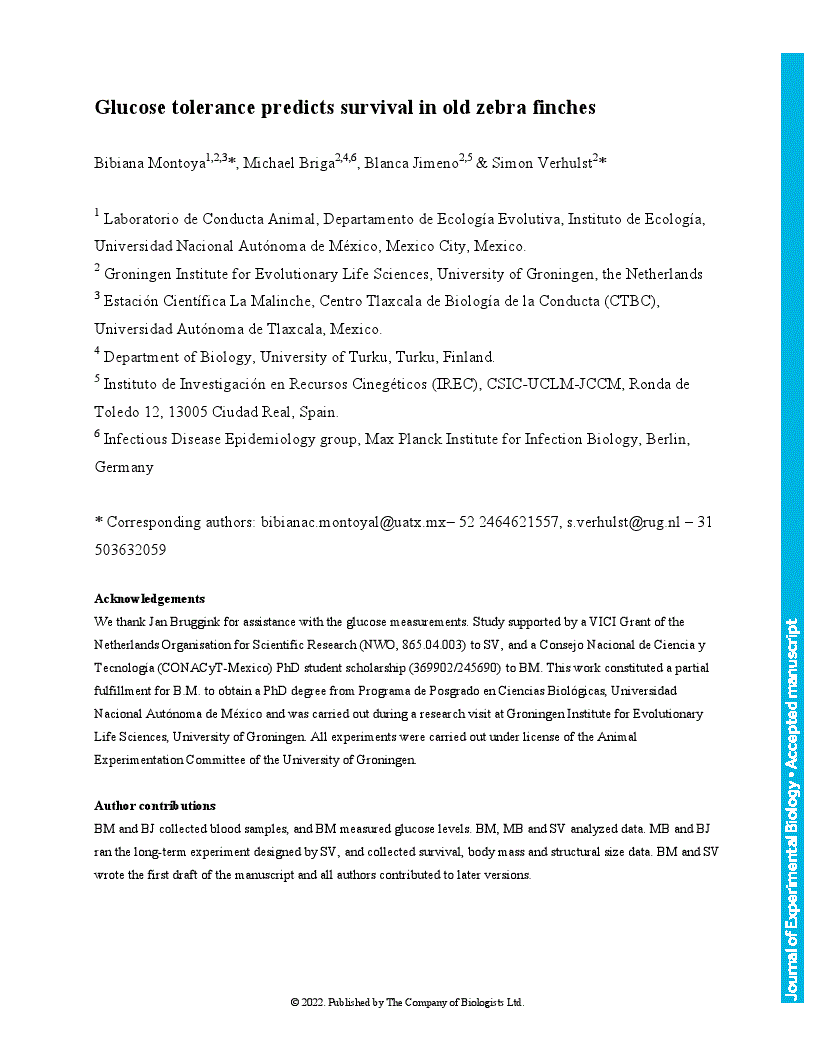The capacity to deal with external and internal challenges is thought to affect fitness, and the age-linked impairment of this capacity defines the ageing process. Using a recently developed intra-peritoneal glucose tolerance test (GTT) in zebra finches, we tested for a link between the capacity to regulate glucose levels and survival. We also investigated for the effects of ambient factors, age, sex, and manipulated developmental and adult conditions (i.e. natal brood size and foraging cost, in a full factorial design) on glucose tolerance. Glucose tolerance was quantified using the incremental ‘area under the curve’ (AUC), with lower values indicating higher tolerance. Glucose tolerance predicted survival probability in old birds, above the median age, with individuals with higher glucose tolerance showing better survival than individuals with low or intermediate glucose tolerance. In young birds there was no association between glucose tolerance and survival. Experimentally induced adverse developmental conditions did not affect glucose tolerance, but low ambient temperature at sampling and hard foraging conditions during adulthood induced a fast return to baseline levels (i.e. high glucose tolerance). These findings can be interpreted as an efficient return to baseline glucose levels when energy requirements are high, with glucose presumably being used for energy metabolism or storage. Glucose tolerance was independent of sex. Our main finding that old birds with higher glucose tolerance had better survival supports the hypothesis that the capacity to efficiently cope with a physiological challenge predicts lifespan, at least in old birds.
Glucose tolerance predicts survival in old zebra finches
- Award Group:
- Funder(s): Nederlandse Organisatie voor Wetenschappelijk Onderzoek
- Award Id(s): 865.04.003
- Funder(s):
- Award Group:
- Funder(s): Consejo Nacional de Ciencia y Tecnologia
- Award Id(s): 369902/245690
- Funder(s):
Currently Viewing Accepted Manuscript - Newer Version Available
Bibiana Montoya, Michael Briga, Blanca Jimeno, Simon Verhulst; Glucose tolerance predicts survival in old zebra finches. J Exp Biol 2022; jeb.243205. doi: https://doi.org/10.1242/jeb.243205
Download citation file:
Advertisement
2023 JEB Outstanding Paper Prize shortlist and winner

The JEB Editors are delighted to announce the shortlisted authors for the 2023 JEB Outstanding Paper Prize. Read the winning paper - Tiny spies: mosquito antennae are sensitive sensors for eavesdropping on frog calls - by Hoover Pantoja-Sanchez and Brian Leavell from Ximena Bernal's lab at Purdue University, USA.
JEB Science Communication Workshop for ECRs

If you’re an early-career researcher interested in science communication and are attending the SEB Annual Conference in Prague this summer, come a day early and join the JEB Editors at a sci comm workshop to learn the key writing skills needed to promote your research to a broad audience beyond your peers (1 July at 14.30-17.30). Places are limited to 24 attendees, and applicants should apply through the SEB registration page by 30 April 2024.
Bridging the gap between controlled conditions and natural habitats in understanding behaviour

Novel technologies enable behavioural experiments with non-model species, in naturalistic habitats and with underexplored behaviours. In their Commentary, Scholz and colleagues discuss how to obtain a deeper understanding of the natural ecology and lifestyle of study animals.
Beluga metabolic measures could help save species

To help save animals from extinction, it’s important to understand what each species needs to survive. This led Jason John et al. to measure the metabolic rates of captive belugas to develop a ‘fish calculator’ showing that the whales need to eat ~23 salmon per day.
ECR Workshop on Positive Peer Review

Are you an ECR looking for tips on how to write concise, astute and useful manuscript reviews? If so, join the JEB Editors at a 2-hour JEB-sponsored Workshop on Positive Peer Review at the Canadian Society of Zoologists annual meeting in Moncton on 9 May 2024 at 13.00-15.00. There are 25 spaces for ECRs and selection is first come, first serve. To sign up, check the ECR Workshop box when you register for the CSZ meeting.



